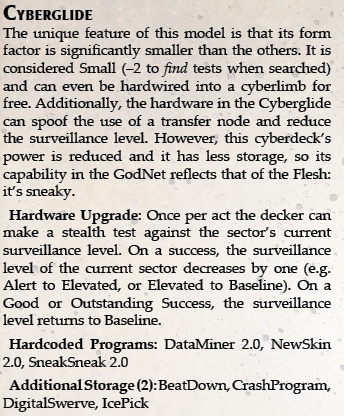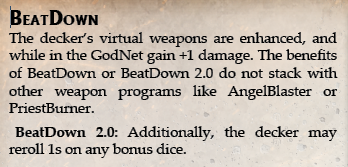18 Nov Cyberpapacy Preview #9 – The GodNet (Part 2)
Cyberpapacy Preview #9 – The GodNet (Part 2)

Today we’re going to take another look at what makes the GodNet tick.
GodNet Basics
Although the GodNet is a virtual reality network, for those who are jacked in, it essentially feels similar to the Flesh, or the “real world”. It’s just that the environment is more artificial. There is still an underlying topography in place: sectors connected by datapaths, with constructs (the “buildings” of the GodNet) containing nodes. However, these all appear in the GodNet as structures or objects (i.e. a node could be a door, an archway, or even a wayside shrine).
Avatars
When jacked into the GodNet, a person’s soul is literally uploaded into the system, and so by default their appearance is based on who a person truly is. For most people this is essentially the same as how they appear in the Flesh, but for others (especially for transgender, non-binary, and genderfluid people) their appearance (and specifically their gender) is based on who they truly are.
Deckers with the NewSkin program can appear as a completely different (though not specific) person.
Those who log into the GodNet via sanctioned neural jacks or TempTrodes appear with clothing but no other equipment. “Nodders” (those who access the GodNet through hacked devices) appear with the equipment they associate themselves with. For game purposes this is generally what they have at the beginning of a mission (i.e. what is permanently on their character sheet). The GM makes the final ruling on what applies. Deckers however, can provide “more equipment” with particular programs.
The “Hacker Problem”
A common issue with virtual realities in roleplaying games is that it often ends up becoming a side mission with specialized rules for one player that can move focus to them for an inordinate amount of time, leaving the rest of the players with a lot of dead-time. Additionally, the hacker’s character can be amazing while jacked in, but outside the VR environment, they’re not very useful.
In Torg Eternity, this issue is magnified by the fact that the GodNet is a special feature of just one cosm, so it’s important that the decker be able to do their cool things in the GodNet but still be able to be useful in other realms.
There are a couple of ways we attempt to address this in Torg Eternity:
- Don’t Sweat the Small Stuff: Often “jacking into the GodNet” is handled just through a skill test (usually computers). If you’re needing your decker to hack a door, it’s not necessary to have a full GodNet mission to do so. Going into the GodNet in-game is reserved for those times it’s important to dive into the details.
- It’s Dangerous to Go Alone! Take…Friends.: While the GodNet is new compared to the cybernetic advancements of the Cyberpapacy, it’s old enough that the age of the solo decker is over. The security and surveillance of the really important locations and information is just too good. It’s not a question of whether a decker will be detected, but when. So even though the decker might be the best at what she does, she still needs help keeping the forces of the Church off her while she breaks into a Reliquary or other secure node.
Cyberdecks and Programs
The Cyberpapacy Sourcebook includes several cyberdecks and programs for them to run. The basic cyberdeck is the First Seal, which replaces the one listed in the Core Book. Anyone with a neural jack can use the First Seal, but it is not customizable, and does not have as many programs as other cyberdecks.
Deckers customize their own rigs (by selecting the Custom Cyberdeck Perk), and each cyberdeck is attuned to a particular decker. Other Hacker Perks include upgrading programs or increasing storage space. Here’s an example cyberdeck and program:


If you have any questions, head on over to our forums!
Art: Bien Flores and Unique Spoarie




